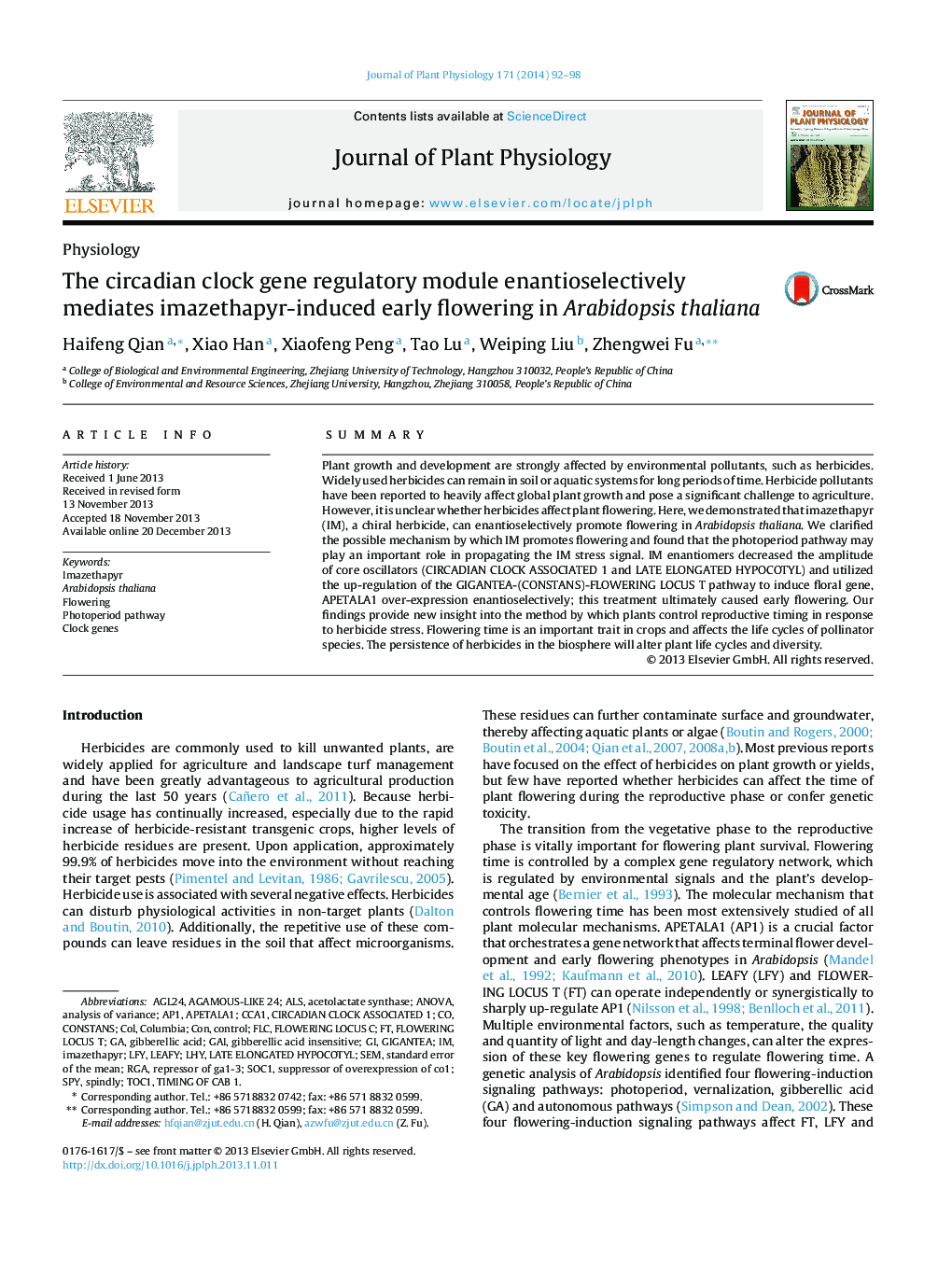| کد مقاله | کد نشریه | سال انتشار | مقاله انگلیسی | نسخه تمام متن |
|---|---|---|---|---|
| 10876894 | 1075782 | 2014 | 7 صفحه PDF | دانلود رایگان |
عنوان انگلیسی مقاله ISI
The circadian clock gene regulatory module enantioselectively mediates imazethapyr-induced early flowering in Arabidopsis thaliana
دانلود مقاله + سفارش ترجمه
دانلود مقاله ISI انگلیسی
رایگان برای ایرانیان
کلمات کلیدی
AP1REPRESSOR OF ga1-3AGL24TOC1LHYCCA1APETALA1LATE ELONGATED HYPOCOTYLSOC1LFYFLCImazethapyrGAIArabidopsis thaliana - آرابیدوپسیس تالیاناacetolactate synthase - استاتولاکتانت سنتازSpindly - اسپیندلیcon - باLEAFY - برگALS - بیماری اسکلروز جانبی آمیوتروفیکanalysis of variance - تحلیل واریانسANOVA - تحلیل واریانس Analysis of varianceFlowering locus T - تلقیح توت TSpy - جاسوسیgibberellic acid - جیبرلیک اسیدstandard error of the mean - خطای استاندارد میانگینRga - راگاSEM - مدل معادلات ساختاری / میکروسکوپ الکترونی روبشیClock genes - ژنهای ساعتColumbia - کلمبیاControl - کنترلCONSTANS - کنستانسcol - کولFLOWERING LOCUS C - گل LOCUS CFlowering - گل زدنGIGANTEA - گیگنتا
موضوعات مرتبط
علوم زیستی و بیوفناوری
علوم کشاورزی و بیولوژیک
علوم زراعت و اصلاح نباتات
پیش نمایش صفحه اول مقاله

چکیده انگلیسی
Plant growth and development are strongly affected by environmental pollutants, such as herbicides. Widely used herbicides can remain in soil or aquatic systems for long periods of time. Herbicide pollutants have been reported to heavily affect global plant growth and pose a significant challenge to agriculture. However, it is unclear whether herbicides affect plant flowering. Here, we demonstrated that imazethapyr (IM), a chiral herbicide, can enantioselectively promote flowering in Arabidopsis thaliana. We clarified the possible mechanism by which IM promotes flowering and found that the photoperiod pathway may play an important role in propagating the IM stress signal. IM enantiomers decreased the amplitude of core oscillators (CIRCADIAN CLOCK ASSOCIATED 1 and LATE ELONGATED HYPOCOTYL) and utilized the up-regulation of the GIGANTEA-(CONSTANS)-FLOWERING LOCUS T pathway to induce floral gene, APETALA1 over-expression enantioselectively; this treatment ultimately caused early flowering. Our findings provide new insight into the method by which plants control reproductive timing in response to herbicide stress. Flowering time is an important trait in crops and affects the life cycles of pollinator species. The persistence of herbicides in the biosphere will alter plant life cycles and diversity.
ناشر
Database: Elsevier - ScienceDirect (ساینس دایرکت)
Journal: Journal of Plant Physiology - Volume 171, Issue 5, 1 March 2014, Pages 92-98
Journal: Journal of Plant Physiology - Volume 171, Issue 5, 1 March 2014, Pages 92-98
نویسندگان
Haifeng Qian, Xiao Han, Xiaofeng Peng, Tao Lu, Weiping Liu, Zhengwei Fu,